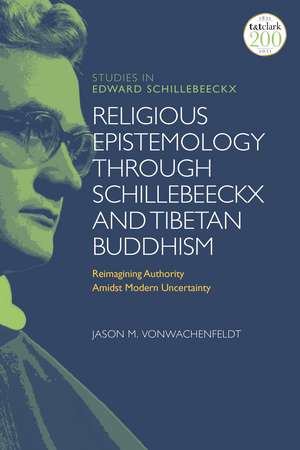Religious Epistemology through Schillebeeckx and Tibetan Buddhism: Reimagining Authority Amidst Modern Uncertainty: T&T Clark Studies in Edward Schillebeeckx
Autor Dr Jason M. VonWachenfeldten Limba Engleză Paperback – 21 sep 2022
| Toate formatele și edițiile | Preț | Express |
|---|---|---|
| Paperback (1) | 198.40 lei 6-8 săpt. | +74.11 lei 10-14 zile |
| Bloomsbury Publishing – 21 sep 2022 | 198.40 lei 6-8 săpt. | +74.11 lei 10-14 zile |
| Hardback (1) | 496.27 lei 3-5 săpt. | +29.16 lei 10-14 zile |
| Bloomsbury Publishing – 10 feb 2021 | 496.27 lei 3-5 săpt. | +29.16 lei 10-14 zile |
Preț: 198.40 lei
Preț vechi: 258.21 lei
-23% Nou
Puncte Express: 298
Preț estimativ în valută:
37.96€ • 39.74$ • 31.41£
37.96€ • 39.74$ • 31.41£
Carte tipărită la comandă
Livrare economică 05-19 aprilie
Livrare express 04-08 martie pentru 84.10 lei
Preluare comenzi: 021 569.72.76
Specificații
ISBN-13: 9780567699350
ISBN-10: 0567699358
Pagini: 264
Dimensiuni: 156 x 234 x 19 mm
Greutate: 0.37 kg
Editura: Bloomsbury Publishing
Colecția T&T Clark
Seria T&T Clark Studies in Edward Schillebeeckx
Locul publicării:London, United Kingdom
ISBN-10: 0567699358
Pagini: 264
Dimensiuni: 156 x 234 x 19 mm
Greutate: 0.37 kg
Editura: Bloomsbury Publishing
Colecția T&T Clark
Seria T&T Clark Studies in Edward Schillebeeckx
Locul publicării:London, United Kingdom
Caracteristici
Examines the complexities of Tibetan Buddhist philosophy, particularly for Catholic thinkers less familiar with the Tibetan Tradition itself
Notă biografică
Jason VonWachenfeldt is the Chair for the Religion and Philosophy Department at The Lawrenceville School, USA.
Cuprins
IntroductionThe Problem of Objective "Truth" and the Threat of Relativism for Religious Practitioners in the Modern WorldChapter 1 Comparative Theology, Religious Diversity, and the Question of Ultimate TruthChapter 2The "Bridge Concept" and Its MaterialsChapter 3The Histories of Individuals, and the Context for Their IdeasChapter 4 The Roles of Individual Intellect and the Collective Intelligence of the Community in Knowledge FormationChapter 5 The Role of the Historical Founders of Religious Traditions in Shaping and Conveying Religious Knowledge, Meaning, and Truth for Contemporary BelieversChapter 6 The Role and Authority of Personal Experience in the Apophatic Knowledge of Ultimate RealityConclusionPossible Madhyamaka Implications for Catholic TheologyBibliographyIndex
Recenzii
VonWachenfeldt brilliantly explores the creative theories of religious experience and knowledge proposed by Schillebeeckx and Chopel in contexts of widespread doubt where traditional authority was questioned. Respecting their important differences, he demonstrates how Christian and Tibetan Buddhist perspectives can challenge and enrich each other. This is a major contribution to Buddhist-Christian scholarship.
There is no better way to do fundamental theology in a relativist culture than comparatively. First, introduce two large thinkers of different traditions. Then ask neutral bridge questions: how do they handle historical perspective, dynamics of interpretation, negative dialectics, and openness to the future? Jason VonWachenfeldt concludes this study of Schillebeeckx and Chopel with a brilliant constructive justification of truth claims in a pluralist context.
Von Wachenfeldt's robust comparative analysis of two figures across the Christian and Buddhist worlds demonstrates how rewarding such cross-cultural encounters are in today's global world. The thematic focus on the nature of religious knowledge and experience in the context of historical consciousness makes this work critical for contemporary Catholic theology.
How to embrace the relativizing social construction of all truth-claims without sliding down the slippery slopes of relativism? Von Wachenfeldt answers that question by engaging two contemporary scholars, one Catholic (Schillebeeckx) and the other Tibetan (Chopel), in an intriguing and illuminating conversation. An example of comparative theology at its best.
There is no better way to do fundamental theology in a relativist culture than comparatively. First, introduce two large thinkers of different traditions. Then ask neutral bridge questions: how do they handle historical perspective, dynamics of interpretation, negative dialectics, and openness to the future? Jason VonWachenfeldt concludes this study of Schillebeeckx and Chopel with a brilliant constructive justification of truth claims in a pluralist context.
Von Wachenfeldt's robust comparative analysis of two figures across the Christian and Buddhist worlds demonstrates how rewarding such cross-cultural encounters are in today's global world. The thematic focus on the nature of religious knowledge and experience in the context of historical consciousness makes this work critical for contemporary Catholic theology.
How to embrace the relativizing social construction of all truth-claims without sliding down the slippery slopes of relativism? Von Wachenfeldt answers that question by engaging two contemporary scholars, one Catholic (Schillebeeckx) and the other Tibetan (Chopel), in an intriguing and illuminating conversation. An example of comparative theology at its best.









